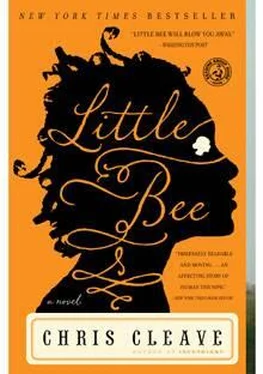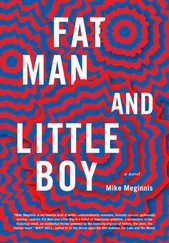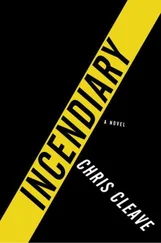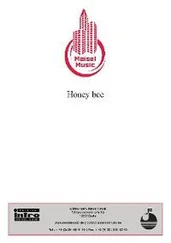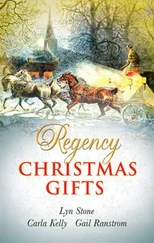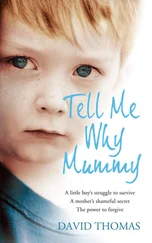Me, I put one small kiss on the cheek of Yevette, who was still sleeping, and I walked off quietly across the fields.
Leaving Yevette, that was the hardest thing I had to do since I left my village. But if you are a refugee, when death comes you do not stay for one minute in the place it has visited. Many things arrive after death-sadness, questions, and policemen-and none of these can be answered when your papers are not in order.
Truly, there is no flag for us floating people. We are millions, but we are not a nation. We cannot stay together. Maybe we get together in ones and twos, for a day or a month or even a year, but then the wind changes and carries the hope away. Death came and I left in fear. Now all I have is my shame and the memory of bright colors and the echo of Yevette’s laugh. Sometimes I feel as lonely as the Queen of England.
It was not difficult to know which way to go. London lit up the sky. The clouds glowed orange, as if the city that awaited me was burning. I walked uphill, through fields with some kind of grain and into a high wood of some kind of trees, and when I looked back down toward the farm for the last time, I saw a floodlight come on outside the barn they put us in. I think it was an automatic light, and standing in the middle of the beam there was the single bright lemon-yellow dot of the sari girl. It was too far away to see her face, but I imagined her blinking in surprise when the light came on. Like an actress who has walked onto the stage by mistake. Like a girl who does not have a speaking part, who is thinking, Why have they turned this great light upon me now?
I was very scared but I did not feel alone. All through that night it seemed to me as if my big sister Nkiruka walked beside me. I could almost see her face, glowing in the pale orange light. We walked all night, across fields and through woods. We steered around the lights of villages. Whenever we saw a farmhouse we went around that too. Once, the farm dogs heard us and barked, but there was no trouble. We kept on walking. My legs were tired. Two years I had been in that detention center, going nowhere, and I was weak. But although my ankles hurt and the backs of my legs ached, it felt very good to be moving, and to be free, and to feel the night air on my face and the grass on my legs, wet from the dew. I know my sister was happy too. She was whistling under her breath. Once when we stopped to rest, she dug her toes into the earth at the edge of a field and smiled. When I saw her smile, I felt strong enough to carry on.
The orange glow of the night faded, and I started to see the fields and the hedges around us. Everything was gray at first, but then the colors began to come into the land-blue and green, but very soft, as if the colors did not have any happiness in them. Then the sun rose, and the whole world turned to gold. The gold was all around me and I was walking through clouds of it. The sun was blazing on the white mist that hung over the fields, and the mist swirled around my legs. I looked over at my sister, but she had disappeared with the night. I smiled though, because I realized that she had left me with her strength. I looked around me at the beautiful sunrise and I was thinking, Yes, yes, everything will be beautiful like this now. I will never be afraid again. I will never spend another day trapped in the color gray.
There was a low roaring, rumbling sound ahead of me. The noise rose and fell in the mist. It is a waterfall, I thought. I must be careful not to fall into the river in this mist.
I walked on, more carefully now, and the noise got louder. Now it did not sound like a river anymore. There were individual sounds in the middle of the roaring. Each sound got louder, rumbling and shaking and then fading away. There was a dirty, sharp smell in the air. Now I could hear the sound of cars and trucks. I went closer. I came to the top of a green grass slope and there it was in front of me. The road was incredible. On my side of it there were three lines of traffic going from right to left. Then there was a low metal barrier, and another three lines of traffic going from left to right. The cars and the trucks were moving very fast. I walked down to the edge of the road and put out my hand to stop the traffic, so I could cross, but the traffic did not stop. A truck blew its horn at me, and I had to step back.
I waited for a gap in the traffic and then I ran across to the center of the road. I climbed over the metal barrier. This time a great many car horns were blown at me. I ran across, and up the green grass bank at the other side of the road. I sat down. I was out of breath. I watched the traffic racing past below me, three lines in one direction and three lines in the other. If I was telling this story to the girls from back home they would be saying, Okay, it was the morning, so the people were traveling to work in the fields. But why do the people who are driving from right to left not exchange their fields with the people who are driving from left to right? That way everyone could work in the fields near to their homes. And then I would just shrug because there are no answers that would not lead to more foolish questions, like What is an office and what crops can you grow in it?
I just fixed the motorway in my mind as a place I could run back to and kill myself very easily if the men suddenly came, and then I stood up and carried on going. I walked for another hour across fields. Then I came to some small roads, and these roads had houses on them. I was amazed when I saw them. They were two stories high and made out of strong red bricks. They had sloping roofs with neat rows of tiles on them. They had white windows, and there was glass in all of them. Nothing was broken. All the houses were very smart, and each one looked like the next. In front of nearly every house there was a car. I walked along the street and I stared at the shining rows of them. These were beautiful cars, sleek and shining, not the kind of vehicles we saw where I came from. In my village there were two cars, one Peugeot and one Mercedes. The Peugeot came before I was born. I know this because the driver was my father, and my village was the place where his Peugeot coughed twice and died in the red dust. He went into the first house in the village to ask if they had a mechanic. They did not have a mechanic but what they did have was my mother, and my father realized he needed her more than he needed a mechanic in any case, and so he stayed. The Mercedes arrived when I was five years old. The driver was drunk, and he crashed into my father’s Peugeot, which was still standing exactly how my father had left it except that the boys had taken one of its tires away to use as the seat of the swing on the limba tree. The driver of the Mercedes got out and he walked over to the first house and met my father there and he said, Sorry. And my father smiled at him and said, We should be thanking you, sir, you have really put our village on the map, this is our very first road traffic accident. And the driver of that Mercedes, he laughed, and he stayed too, and he became great friends with my father, so much that I called him my uncle. And my father and my uncle lived very happily in that place until the afternoon when the men came and shot them.
So, it was astonishing to see all these new, beautiful shining cars parked outside these big, perfect houses. I walked through many streets like this.
I walked all morning. The buildings got bigger and heavier. The streets got wider and busier. I stared at everything, and I did not mind the hunger in my stomach or the aching in my legs because I was amazed by each new wonder. Each time I saw something for the first time-a nearly naked girl on an advertising billboard, or a red double-decker bus, or a glittering building so tall it made you dizzy-the excitement in my stomach was so fierce it hurt. The noise was too much-the roar of the traffic and the shouting. Soon there were such crowds on the streets that it seemed I was nothing. I was pushed and bumped all over the pavements, and no one took any notice of me. I kept on walking as straight as I could, following one street and then another, and just as the buildings got so big it seemed they could not possibly stand up, and the noise got so loud it seemed as if my body would be shaken to pieces, I turned a corner and I gasped and ran across one last busy road, with car horns blasting and the drivers screaming, and I leaned over a low white stone wall and stared and stared, because there in front of me was the River Thames. Boats were pushing along through the muddy brown water, honking their horns under the bridges. All along the river to the left and the right, there were huge towers that rose high into the blue sky. Some were still being built, with huge yellow cranes moving above them. They even trained the birds of the air to help them build? Weh!
Читать дальше
